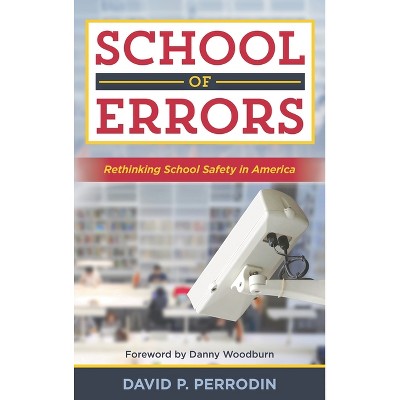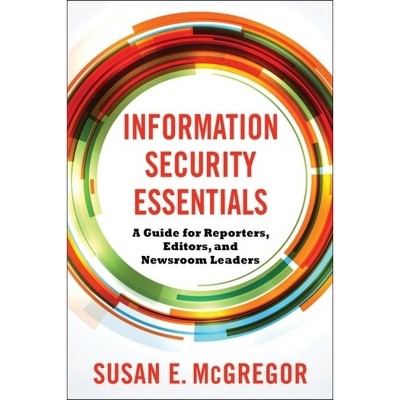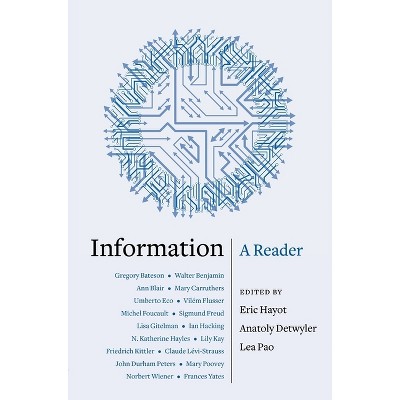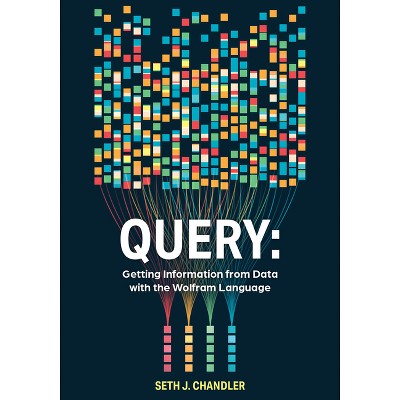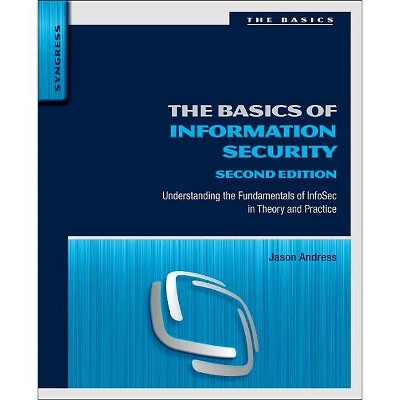The Velocity of Information - by David P Perrodin (Paperback)

About this item
Highlights
- As chaos erupts, alerts screech on our cell phones and torrents of conflicting-yet-urgent messages gush from media outlets.
- About the Author: David P. Perrodin, PhD, is an author, researcher, professor, and host of "The Safety Doc" podcast.
- 208 Pages
- Education, Educational Psychology
Description
About the Book
This book will appeal to a general adult audience interested in contemporary scholarly work about human behavior, chaos, and history.Book Synopsis
As chaos erupts, alerts screech on our cell phones and torrents of conflicting-yet-urgent messages gush from media outlets. What is the magnitude of the crisis? What is its cause? And what should people do to protect themselves?
The speed and direction of these details is known as the velocity of information. It overwhelms and distresses people who have not built a network of trustworthy sources to traverse disorder.
Velocity of Information offers understanding to manage chaos and our complex reactions to crisis situations influenced by bias and propaganda. Recognizing indicators to judge the severity of an incident, understanding human predispositions, and joining a member check network to gauge real-time observations from people in your network provide direction to respond to the reality of a situation with impartiality, thus improving outcomes.
This book also provides a novel framework for understanding chaos based on duration, location, and complexity. Understanding how human cognitive limitations affect individual and group human behavior during different stages of chaos allows readers to use the tools in this book to avoid hysteria and optimize responses to emergency events.
Utilizing personal interviews and explorations of historical and contemporary events, Velocity of Information provides a functional and realistic roadmap with specific, actionable guidance on how to navigate chaos.
Review Quotes
"David P. Perrodin's Velocity of Information will empower its readers. Drawing on current events, history, interviews and scholarship, Velocity of Information is an education in the way people react and adapt to change in this fast-spinning world. Ours is an era of misinformation, slanted stories, and propaganda. Information has never been easier to access; in the smartphone era, we carry the whole world in our back pockets. But how much of what we find is true? Or useful? Never has it been more important to sift facts and stories for truth and meaning. Velocity of Information will teach you how people have done it, in history, in the modern day, and even in prison. It will teach you how to do it. The path forward is lit by Perrodin's assemblage of homesteaders and special forces fighters, of crab boaters, jewel thieves and Nail Men. There are teachable moments on every page." --James David Dickson, The Detroit News
"In a day and age where fact and fiction are becoming increasingly harder to separate, David P. Perrodin's Velocity of Information is a modern-day textbook on critical thinking. Drawing on numerous historical events such as the Chernobyl nuclear disaster and soldier morale in World War II, he explains how interpreting information, and controlling our biases, is just as important as knowing how to gather it. Whether a digital immigrant or native, Perrodin's book is an invaluable guide on navigating a data-saturated world." --TJ Martinell, Lens award-winning reporter and writer at the Tenth Amendment Center "Overnight you were either deemed inessential or drafted into a war against an invisible enemy. The only thing scarier than the hasty arbitrariness of these decisions was how easily we complied. David P. Perrodin breaks down the pandemic reaction game film in a way that will both inform and infuriate." --Kevin Dalton, 2022 mayoral candidate, City of Los Angeles, California "You will be ensnared by the way David P. Perrodin offers perspective and insight into our chaotic world. Information is our greatest asset, the more we can learn about the world and how we function in it, the better we can be prepared to handle it. Velocity of Information is a must-read." --Morgan Rogue, founder, Rogue Preparedness "A Thundering Tour de Force on Force Majeures, with Electric Ideas on Human Behavior in Chaotic Times David P. Perrodin's masterpiece on human responses in the face of chaotic times, "The Velocity of Information," is but a few months old, and I am writing after my THIRD read in just about two weeks' time. "The Velocity of Information" is an electric, touchstone must-read. "The Velocity of Information" is not a tuppence less than RICH in treasured perspective and pragmatic advice for the reader trying to make sense of the world, when all hell seems to be breaking loose. Perrodin is a maestro in conducting a symphony of instrumental voices in the production of a practical guidebook for talking about and interpreting chaos, including intimate, hard-to-come-by interviews he conducted of figures with privileged vantages on a range of life-and-death chaos situations they (and humankind) have found themselves in, to pass along their critical advice to his readers. Perrodin's intense interest in chaos and human adaptation to it is akin to Alfred Korzybski's in "Science and Sanity" (2nd edition 1941); in both works, the authors write of world wars and how humans adjust -- or fail to adjust -- to them. In fact, although Perrodin has a background in psycholinguistics and does not appear to draw from Korzybski's discipline of General Semantics, Perrodin's advice is consonant with GS, with his discussions of wartime propaganda and soldier mental health; his recommendations of adding the phrase "I observe" to report language and creating a member check network to validate or refute rumors; and his explicit desire to provide terminology for repeat patterns of human behavior occurring when people face chaotic times -- all aimed to aid mental health and human survival on a species scale. The lasting memories a reader will have after opening this book will be the mesmeric terminology Perrodin applies to chaos situations. "Finite voltage," "indicators," "crowd-in behavior," "the Torus," "face validity," "wet bulbs," and many, many more metaphorical terms will affix to your thinking, and you will start to visualize -- nay, *perceive* -- the hidden patterns he calls out in a world thrown into disorder. While "The Velocity of Information" is an academic work with abundant endnote citations to his positions and perspectives, Dr. Perrodin's work is also a wholly accessible read written ... almost conversationally. With that said, the work is also neutral in perspective, leaving the reader not knowing Perrodin's personal leanings one way or another on some of the topics discussed. This is *A PLUS* for the broad audience at which this book aims. "The Velocity of Information" is a brilliant and eye-opening work that will sit as a pride piece on your bookshelf -- inevitably with creases in the spine from multiple reads. Perrodin's book is a stimulating conversation-starter and mind-expanding page-turner, as well as a hearty handbook for handling haphazard havoc happening to humanity." --Ben Hauck, Trustee, Institute of General Semantics "The Velocity of Information is a must-read for anyone looking to improve their decision-making game. Perrodin breaks a large amount of data down into seven chapters of valuable information using examples from actual chaos events as well as case studies of the people involved to help you with your decision-making process. The principles apply whether it's for a true chaos event, hurricane, protests, industrial accident, or just plain living. The Velocity of Information will empower its readers with its teachable moments and actionable items. In the words of Perrodin, "Stop outsourcing your thinking. The more you steer your own wheel, the harder it becomes for others to steer you."" --OffGrid MagazineA Thundering Tour de Force on Force Majeures, with Electric Ideas on Human Behavior in Chaotic Times
David P. Perrodin's masterpiece on human responses in the face of chaotic times, "The Velocity of Information," is but a few months old, and I am writing after my THIRD read in just about two weeks' time. "The Velocity of Information" is an electric, touchstone must-read.
"The Velocity of Information" is not a tuppence less than RICH in treasured perspective and pragmatic advice for the reader trying to make sense of the world, when all hell seems to be breaking loose. Perrodin is a maestro in conducting a symphony of instrumental voices in the production of a practical guidebook for talking about and interpreting chaos, including intimate, hard-to-come-by interviews he conducted of figures with privileged vantages on a range of life-and-death chaos situations they (and humankind) have found themselves in, to pass along their critical advice to his readers.
Perrodin's intense interest in chaos and human adaptation to it is akin to Alfred Korzybski's in "Science and Sanity" (2nd edition 1941); in both works, the authors write of world wars and how humans adjust -- or fail to adjust -- to them. In fact, although Perrodin has a background in psycholinguistics and does not appear to draw from Korzybski's discipline of General Semantics, Perrodin's advice is consonant with GS, with his discussions of wartime propaganda and soldier mental health; his recommendations of adding the phrase "I observe" to report language and creating a member check network to validate or refute rumors; and his explicit desire to provide terminology for repeat patterns of human behavior occurring when people face chaotic times -- all aimed to aid mental health and human survival on a species scale.
The lasting memories a reader will have after opening this book will be the mesmeric terminology Perrodin applies to chaos situations. "Finite voltage," "indicators," "crowd-in behavior," "the Torus," "face validity," "wet bulbs," and many, many more metaphorical terms will affix to your thinking, and you will start to visualize -- nay, *perceive* -- the hidden patterns he calls out in a world thrown into disorder.
While "The Velocity of Information" is an academic work with abundant endnote citations to his positions and perspectives, Dr. Perrodin's work is also a wholly accessible read written ... almost conversationally. With that said, the work is also neutral in perspective, leaving the reader not knowing Perrodin's personal leanings one way or another on some of the topics discussed. This is *A PLUS* for the broad audience at which this book aims.
"The Velocity of Information" is a brilliant and eye-opening work that will sit as a pride piece on your bookshelf -- inevitably with creases in the spine from multiple reads. Perrodin's book is a stimulating conversation-starter and mind-expanding page-turner, as well as a hearty handbook for handling haphazard havoc happening to humanity.
David P. Perrodin's Velocity of Information will empower its readers. Drawing on current events, history, interviews and scholarship, Velocity of Information is an education in the way people react and adapt to change in this fast-spinning world. Ours is an era of misinformation, slanted stories, and propaganda. Information has never been easier to access; in the smartphone era, we carry the whole world in our back pockets. But how much of what we find is true? Or useful? Never has it been more important to sift facts and stories for truth and meaning. Velocity of Information will teach you how people have done it, in history, in the modern day, and even in prison. It will teach you how to do it. The path forward is lit by Perrodin's assemblage of homesteaders and special forces fighters, of crab boaters, jewel thieves and Nail Men. There are teachable moments on every page.
In a day and age where fact and fiction are becoming increasingly harder to separate, David P. Perrodin's Velocity of Information is a modern-day textbook on critical thinking. Drawing on numerous historical events such as the Chernobyl nuclear disaster and soldier morale in World War II, he explains how interpreting information, and controlling our biases, is just as important as knowing how to gather it. Whether a digital immigrant or native, Perrodin's book is an invaluable guide on navigating a data-saturated world.
Overnight you were either deemed inessential or drafted into a war against an invisible enemy. The only thing scarier than the hasty arbitrariness of these decisions was how easily we complied. David P. Perrodin breaks down the pandemic reaction game film in a way that will both inform and infuriate.
The Velocity of Information is a must-read for anyone looking to improve their decision-making game. Perrodin breaks a large amount of data down into seven chapters of valuable information using examples from actual chaos events as well as case studies of the people involved to help you with your decision-making process. The principles apply whether it's for a true chaos event, hurricane, protests, industrial accident, or just plain living. The Velocity of Information will empower its readers with its teachable moments and actionable items. In the words of Perrodin, "Stop outsourcing your thinking. The more you steer your own wheel, the harder it becomes for others to steer you."
You will be ensnared by the way David P. Perrodin offers perspective and insight into our chaotic world. Information is our greatest asset, the more we can learn about the world and how we function in it, the better we can be prepared to handle it. Velocity of Information is a must-read.
About the Author
David P. Perrodin, PhD, is an author, researcher, professor, and host of "The Safety Doc" podcast. Dr. Perrodin is a speech-language pathologist specializing in psycholinguistics. He has presented on PBS and written and directed a film about school safety with Pulitzer Prize winner David Obst. Dr. Perrodin is the author of the book School of Errors: Rethinking School Safety in America.Shipping details
Return details
Trending Non-Fiction






